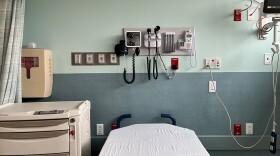If you’ve got health insurance, you know it can be hard to get a routine doctor’s appointment.
Representative Neal Kurk (R-Weare), who sits on the commission studying a possible Medicaid expansion, worries it could get harder.
“As a public official, will I start getting calls from my constituents saying, I had to wait another seven weeks for my doctor’s appointment? My operation took much longer on the left hip that it did on the right hip,” says Kurk.
Dr. Gergory Soghikian is well positioned to field that question. He’s an orthopedic surgeon and past president of the New Hampshire Orthopedic Society.
“Typically, total hips and total knees, usually getting done in a two month period,” says Soghikian.
"In terms of total active doctors, New Hampshire is above the national average. It actually ranks 9th in the physician-to-population ratio."
He says even with an expansion of Medicaid, that wait-time likely won’t change because his specialty isn’t short on physicians.
Broaden the lens, though, and the picture gets different.
Nationally, an aging Baby Boomer population and the influx of newly insured through so-called Obamacare will leave the country short by about 90,000 physicians by the end of the decade.
Clese Erikson with the Association of American Medical Colleges says New Hampshire, at least on a per-capita basis, would seem prepared.
“In terms of total active doctors, New Hampshire is above the national average. It actually ranks 9th in the physician-to-population ratio,” says Erikson.
She says the state ranks 5th in the ratio of primary care doctors. But not all of them take patients covered by Medicaid, meaning those that do will be further stretched. The Affordable Care Act saw this problem coming and put extra money aside.
This year and next, primary care docs will get reimbursed for treating Medicaid patients at higher Medicare rates.
Tess Kuenning says that could help increase services at community health clinics. She’s President of the Bi-State Primary Care Association.
“As you get more resources into the health centers, then you can use those resources to continue to build primary care capacity,” says Kuenning.
It may not be just doctors that fill that capacity. Physician assistants and nurse practitioners are also gearing up for a possible expansion.
“Nurse practitioners will have more opportunity to work within organizations that are expanding their primary care programs,” says Gene Harkless, President of the New Hampshire Nurse Practitioner Association. “Nurse practitioners will have more opportunity to consider whether they want to start their own business.”
"It is a challenge to recruit doctors to the area, because they really have to want to be in our rural communities, and they have to be able to find what is necessary for them and their partners and their families."
Along with primary care needs, there’s concern that the state’s already strained mental health system won’t be able to handle an influx of new patients.
“Having more people with Medicaid does not put more psychiatrists in New Hampshire ,” says Jeffrey Fetter, President of the NH Psychiatric Society.
Wait times at community mental health centers vary, but most facilities currently can see new patients within 10 business days. And like other health clinics, Medicaid expansion means these non-profits could get paid for the patients they currently see for free.
Nancy Frank with the North Country Health Consortium says the reimbursement issue is especially important in Coos County, where doctors are already in short supply.
“It is a challenge to recruit doctors to the area, because they really have to want to be in our rural communities, and they have to be able to find what is necessary for them and their partners and their families,” says Frank.
The Commission, meanwhile, will continue to debate the necessity of Medicaid expansion. A potential doctor shortage is just one of the issues involved.







